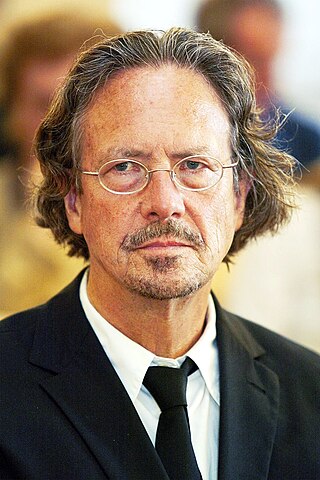
The 2019 Nobel Prize in Literature was awarded to the Austrian writer Peter Handke "for an influential work that with linguistic ingenuity has explored the periphery and the specificity of human experience." The prize was announced by the Swedish Academy on 10 October 2019. Handke is the second Austrian Nobel laureate in Literature after Elfriede Jelinek, who won the prize in 2004.
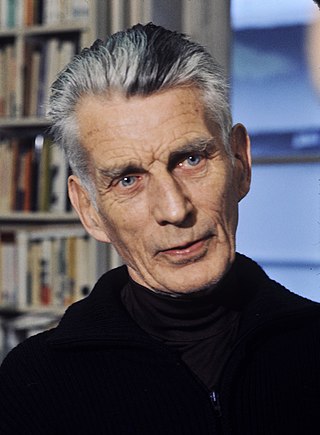
The 1969 Nobel Prize in Literature was awarded to the Irish author Samuel Beckett (1906–1989) "for his writing, which - in new forms for the novel and drama - in the destitution of modern man acquires its elevation."

The 2010 Nobel Prize in Literature was awarded the Peruvian writer Mario Vargas Llosa "for his cartography of structures of power and his trenchant images of the individual's resistance, revolt, and defeat." The prize was announced by the Swedish Academy on 7 October 2010. He is the first Nobel laureate in Literature from Peru and the fifth Latin American to become one after 1982 Colombian laureate Gabriel García Márquez and 1971 Chilean laureate Pablo Neruda.

The 2018 Nobel Prize in Literature was awarded the Polish writer Olga Tokarczuk "for a narrative imagination that with encyclopedic passion represents the crossing of boundaries as a form of life." The prize was announced the following year by the Swedish Academy on 10 October 2019. Tokarczuk is the sixth Nobel laureate in Literature from Poland after the poet Wisława Szymborska in 1996, and Czesław Miłosz in 1980.
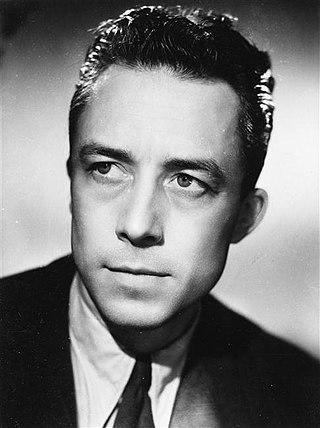
The 1957 Nobel Prize in Literature was awarded the French writer Albert Camus (1913–1960) "for his important literary production, which with clear-sighted earnestness illuminates the problems of the human conscience in our times." He is the ninth French author to become a recipient of the prize after Catholic novelist François Mauriac in 1952, and the fourth philosopher after British analytic philosopher Bertrand Russell in 1950.
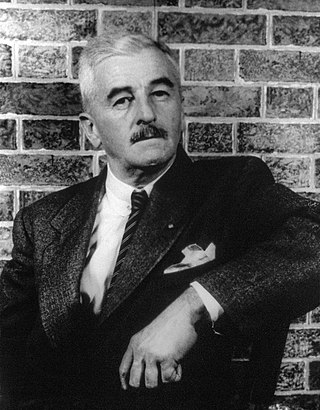
The 1949 Nobel Prize in Literature was awarded the American author William Faulkner (1897–1962) "for his powerful and artistically unique contribution to the modern American novel." The prize was awarded the following year on October 1950. The Nobel Committee for Literature had decided that none of the nominations for 1949 met the criteria as outlined in the will of Alfred Nobel, and the prize was reserved until the following year.

The 2017 Nobel Prize in Literature was awarded to the British novelist Kazuo Ishiguro "who, in novels of great emotional force, has uncovered the abyss beneath our illusory sense of connection with the world." The prize was announced by the Swedish Academy on 5 October 2017.

The 1966 Nobel Prize in Literature was divided equally between Shmuel Yosef Agnon (1888–1970) "for his profoundly characteristic narrative art with motifs from the life of the Jewish people" and Nelly Sachs (1891–1970) "for her outstanding lyrical and dramatic writing, which interprets Israel's destiny with touching strength."

The 2006 Nobel Prize in Literature was awarded to the Turkish writer Orhan Pamuk "who in the quest for the melancholic soul of his native city has discovered new symbols for the clash and interlacing of cultures."

The 2022 Nobel Prize in Literature was awarded to the French author Annie Ernaux "for the courage and clinical acuity with which she uncovers the roots, estrangements and collective restraints of personal memory". It was announced by the Swedish Academy on 6 October 2022. Ernaux was the 16th French writer – the first Frenchwoman – and the 17th female author, to receive the Nobel Prize in Literature.

The 2021 Nobel Prize in Literature was awarded to the Tanzanian-born British novelist Abdulrazak Gurnah who the Swedish Academy members praised "for his uncompromising and compassionate penetration of the effects of colonialism and the fate of the refugee in the gulf between cultures and continents." The winner was announced on October 7, 2021, by Mats Malm, permanent secretary of the Swedish Academy.
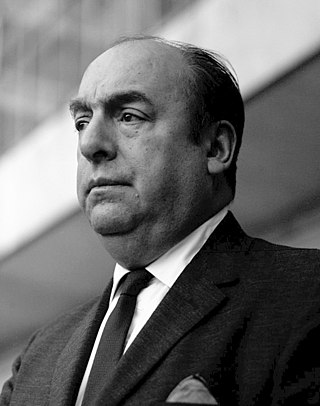
The 1971 Nobel Prize in Literature was awarded to the Chilean politician and poet Pablo Neruda (1904–1973) "for a poetry that with the action of an elemental force brings alive a continent's destiny and dreams." Neruda became the second Chilean Nobel laureate in Literature after Gabriela Mistral in 1945.
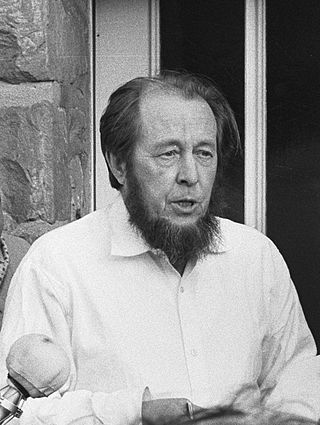
The 1970 Nobel Prize in Literature was awarded to the Russian novelist Aleksandr Solzhenitsyn (1918–2008) "for the ethical force with which he has pursued the indispensable traditions of Russian literature." For political reasons he would not receive the prize until 1974. Solzhenitsyn is the fourth Russian recipient of the prize after Ivan Bunin in 1933, Boris Pasternak in 1958 and Mikhail Sholokhov in 1965.

The 1972 Nobel Prize in Literature was awarded to the German author Heinrich Böll (1917–1985) "for his writing which through its combination of a broad perspective on his time and a sensitive skill in characterization has contributed to a renewal of German literature." Böll is the fifth German author to be recipient of the prize.

The 2014 Nobel Prize in Literature was awarded to the French novelist Patrick Modiano "for the art of memory with which he has evoked the most ungraspable human destinies and uncovered the life-world of the occupation." He became the 15th Frenchman to receive the Nobel Prize for Literature after J. M. G. Le Clézio in 2008.

The 2009 Nobel Prize in Literature was awarded to the Romanian-German author Herta Müller "who, with the concentration of poetry and the frankness of prose, depicts the landscape of the dispossessed." She is the ninth German-language writer to become a recipient of the prize after Günter Grass in 1999.

The 2008 Nobel Prize in Literature was awarded to the French novelist Jean-Marie Gustave Le Clézio, better known with his pen name J. M. G. Le Clézio, as an "author of new departures, poetic adventure and sensual ecstasy, explorer of a humanity beyond and below the reigning civilization." He became the 14th French-language author to receive the Nobel Prize for Literature after Claude Simon in 1985 and was followed later by Patrick Modiano in 2014.

The 1950 Nobel Prize in Literature was awarded the British philosopher Bertrand Russell (1872–1970) "in recognition of his varied and significant writings in which he champions humanitarian ideals and freedom of thought." He is the fourth philosopher to become a recipient of the prize after the French analytic-continental philosopher Henri Bergson in 1927, and was followed by the French-Algerian existentialist Albert Camus in 1957. He is also the fifth British author to be awarded.

The 1968 Nobel Prize in Literature was awarded to the Japanese writer Yasunari Kawabata (1899–1972) "for his narrative mastery, which with great sensibility expresses the essence of the Japanese mind." He is the first Japanese recipient of the prize.

The 1983 Nobel Prize in Literature was awarded to the British author William Golding "for his novels which, with the perspicuity of realistic narrative art and the diversity and universality of myth, illuminate the human condition in the world of today".




















